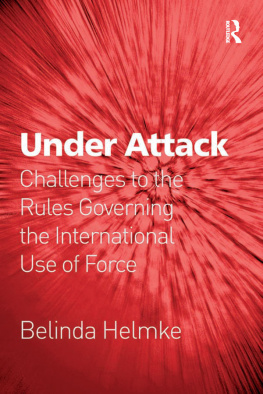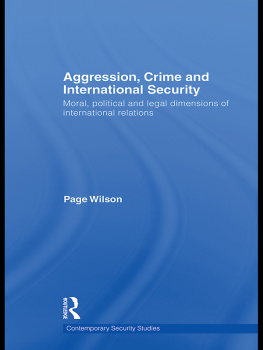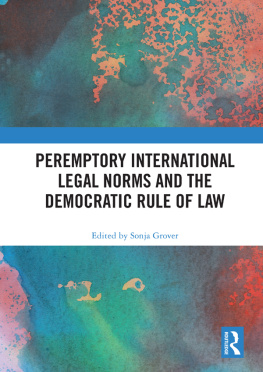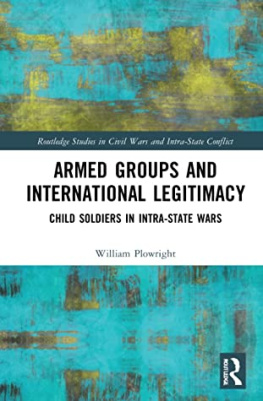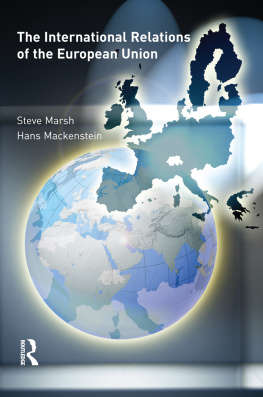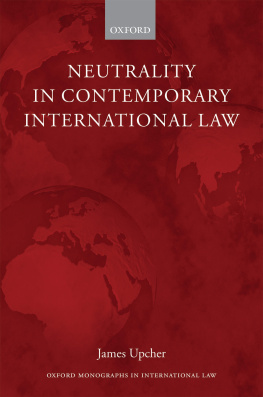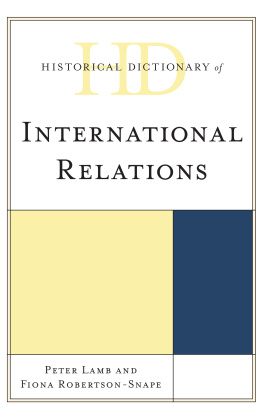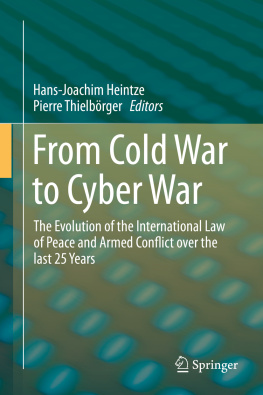UNDER ATTACK
To Greg
For daring me to disturb the universe
To Klaus, Marilyn and Thomas
For supporting me all the way and in every way
Under Attack
Challenges to the Rules Governing the
International Use of Force
BELINDA HELMKE
University of Sydney, Australia
First published 2010 by Ashgate Publishing
Published 2016 by Routledge
2 Park Square, Milton Park, Abingdon, Oxon OX14 4RN
711 Third Avenue, New York, NY 10017, USA
Routledge is an imprint of the Taylor & Francis, an informa business
Copyright Belinda Helmke 2010
Belinda Helmke has asserted her right under the Copyright, Designs and Patents Act, 1988, to be identified as the author of this work.
All rights reserved. No part of this book may be reprinted or reproduced or utilised in any form or by any electronic, mechanical, or other means, now known or hereafter invented, including photocopying and recording, or in any information storage or retrieval system, without permission in writing from the publishers.
Notice:
Product or corporate names may be trademarks or registered trademarks, and are used only for identification and explanation without intent to infringe.
British Library Cataloguing in Publication Data
Helmke, Belinda.
Under attack : challenges to the rules governing the international use of force.
1. Intervention (International law) 2. Aggression (International law)
I. Title
341.62-dc22
Library of Congress Cataloging-in-Publication Data
Helmke, Belinda.
Under attack : challenges to the rules governing the international use of force / by Belinda Helmke.
p. cm.
Includes bibliographical references and index.
ISBN 978-0-7546-7989-9 (hardback)
1. Intervention (International law) 2. War (International law) 3. Security, International.
I. Title.
JZ6368.H45 2010
341.6--dc22
2010004859
ISBN 9780754679899 (hbk)
Contents
The ending of World War II was accompanied by three momentous occurrences that have left a lasting legal imprint on world order: the atomic attacks on Japanese cities, the Nazi Holocaust, and a consensus among the victors that a third world war must be avoided. This imprint exhibited the geopolitical truism that international legal norms and institutions are shaped by the winners in any major war. In practice, this meant no effective repudiation of nuclear weaponry. Instead, a poor substitute has resulted: a non-proliferation regime for nuclear weaponry, thereby shifting attention away from the countries that have possessed the weaponry to those that have aspirations to acquire it. In contrast, genocide (the main crime of the losers) has been criminalized in a treaty that enjoys universal adherence, and aggressive war (also the crime of the losers), was criminalized at Nuremberg and Tokyo when in 1945 the surviving wartime leaders of Germany and Japan were prosecuted, convicted, and punished.
At the same time, the United Nations was established, embodying the victors vision of a constitutional framework for world order taking the form of the UN Charter. Again the outcome of the recently concluded war was prominently reflected: the defeated countries were even initially excluded from membership, and the victors were rewarded with a permanent seat on the Security Council, as well as given a veto power that conferred, in its effect, an exemption from the obligations of international law. The Charter also embodied a compromise between the Westphalian ideal of unrestricted territorial sovereignty for member states and the core undertaking of the UN to save succeeding generations from the scourge of war. In effect, the compromise was expressed by way of an unconditional prohibition on the use of force in international relations (Article 2(4)) unless employed in self-defense against a prior armed attack (Article 51), with the final assessment of the claim to be determined by the Security Council (Article 39) and by denying the UN any right to intervene in the internal affairs of sovereign states (Article 2(7)) unless international peace and security were seriously at stake. In effect, two kinds of conciliation were fused: geopolitical freedom of action for the dominant states with the rule of law for the community of states; collective responsibility for the management of global security with continuing deference to national sovereignty.
More or less, with deviations in practice, this conception of a global legal order persisted unchallenged and unchanged during the several decades of the Cold War. To be sure the main antagonists, the United States and the Soviet Union, used non-defensive and interventionary force on several occasions, but always tried to reconcile their behavior within this accepted legal framework, claiming in most circumstances that force had been previously authorized by some multilateral institution, usually of a regional character, or that the state in question had invited the intervention, thereby giving its consent. Since the UN Security Council was paralyzed by the use of the veto, departures from the legal regime established in 1945 were never definitively censured, although condemned in the mtier of political propaganda. At the same time, there was a rather strong consensus, despite the Cold War, that opposed lending legitimacy to outright cases of aggression across international borders. The UN did condemn all the main instances: the attack by North Korea on South Korea in 1950, the Suez Operation of France, the United Kingdom, and Israel in 1956, the Turkish attack and occupation of Cyprus in 1974, and the Indonesian attack on East Timor in 1975. In a real sense, the prohibition on aggressive force across established international boundaries was consistently supported in the latter half of the 20th century. This support was undoubtedly reinforced by the nuclear standoff between the two superpowers that made the risks of World War III appear unbearable, and shifted the terrain of violent conflict to the internal war zones of the global south that accompanied or followed decolonization struggles.
With the ending of the Cold War, both geopolitically due to the collapse of the Soviet Union and ideologically as a result of all important countries opting for participation in the world economy in accord with a neo-liberal version of capitalism, it appeared as if the legal regime that was nominally in existence since 1945 could now be much more fully implemented. Such expectations seemed partially realized by the Security Council agreement to oppose with overwhelming collective force Iraqs conquest and annexation of Kuwait in 1991, which led to a response within the United Nations, proclaimed at the time by the American president, George H. W. Bush, as the birth of a new world order. But unanticipated concerns soon arose: the rise of human rights generated pressures to engage in humanitarian intervention, and with the Cold War over, there was less reluctance, in part, due to the disappearance of escalation risks. Also, it became evident that certain governments could not provide domestic security or prevent the use of their territory by terrorists or pirates, and could not begin to meet the basic material needs of their populations. Such state were labeled failed states or outlaw states, and deprived of their status as sovereign states. A doctrine of responsible sovereignty came gradually to displace notions of unconditional sovereignty. Further, there arose the related contention that certain states posed dangers beyond their borders, either because seeking nuclear weaponry or by being disruptive of economic globalization. These states were called rogue states by the main geopolitical manager of world order and treated as a threat to regional and global security. The cumulative effect of these developments was to encourage the imposition of sanctions and even threaten or embark upon military intervention according to justifications with little basis in post-World War II international law.

